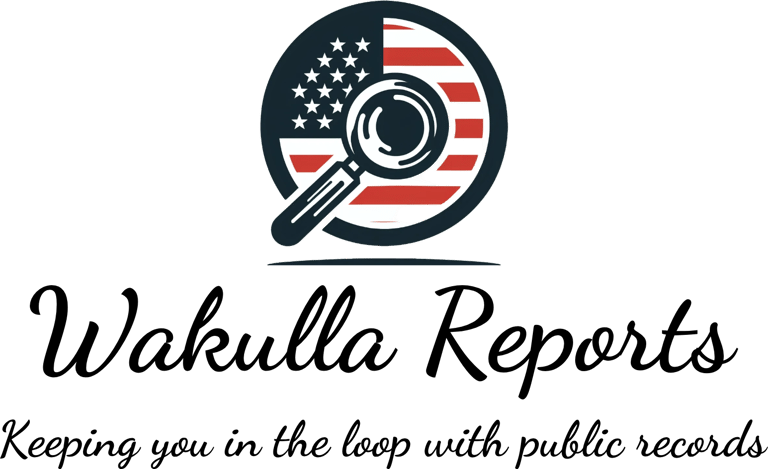🏛️How it Works Part 1: The Basics of Florida’s State Government – The Big Picture
Why Tallahassee Isn’t Just a Dot on the Map—It’s the Power Source Behind Your Taxes, School Rules, and Hurricane Plans
TOOLS YOU CAN USE2025
Virginia H. Hall
9/21/20254 min read


👋 Hey there, Wakulla Reports readers!
Ever wonder why your property taxes spike, who sets the school calendar, or who calls the shots when a hurricane barrels toward the coast? Spoiler: It’s not just your county commissioners—it’s Florida’s state government also pulling the levers.
This isn’t some distant bureaucracy tucked away in Tallahassee. It’s the framework that shapes your daily life—from the roads you drive to the rules your park follows. Understanding it helps you vote smarter, advocate louder, and spot the difference between local decisions and state mandates.
So let’s break it down. No jargon. No eye-glazing civics lectures. Just clear, real-world explanations—with relevant examples.
🌴 Why Understanding Florida’s State Government Matters
Florida’s state government is the engine behind the policies that affect every resident. It:
• Sets education standards
• Manages environmental protections
• Collects taxes to fund highways, healthcare, and more
• Responds to crises like hurricanes (remember Ian? Idalia?)
• Dictates how counties like Wakulla operate
🛑 And here’s the kicker: If Wakulla wants stricter rules on development, wetlands, or vacation rentals, the state can override them. That’s called preemption. It’s a legal power move baked into Florida’s Constitution—and it shows up in every branch of government.
With over 22 million Floridians and counting, these decisions shape growth, jobs, and quality of life. The Florida Constitution (our state’s rulebook since 1968) promises transparency and accountability—but only if we know how to use it.
Bottom line: This government works for you. Let’s unpack how it ticks.
Florida’s Structure: Three Branches, Like the Feds—But Florida-Style
Florida’s government mirrors the U.S. federal system with three branches:
This “separation of powers” prevents any one branch from dominating. Think of it like rock-paper-scissors for grown-ups—checks and balances baked into the Constitution.
🌀 Counties like Wakulla must follow state laws. Even with a charter, the state holds the ultimate authority—and yes, that includes preempting local decisions.
👷 Executive Branch: The Doers, Led by the Governor
The executive branch is all about action. At the top? The Governor—Florida’s CEO.
🧑💼 Governor’s Role:
• Signs or vetoes bills
• Proposes the state budget (recently over $100 billion)
• Declares emergencies (like hurricanes)
• Appoints agency heads and judges
🧑⚖️ Key Officials:
• Lieutenant Governor – backup quarterback
• Attorney General – top lawyer
• Chief Financial Officer – insurance & money watchdog
• Commissioner of Agriculture – farming & consumer protection
These officials are elected separately—built-in checks and balances.
🌀 Local Impact:
Grants for roads, schools, and infrastructure (remember: still your tax dollars, just derived from sales tax, doc stamp tax, and the like at a state level and distributed to the counties)
Oversight from state agencies like DEP (water quality enforcement in Wakulla)
Emergency response coordination (e.g., Hurricane Michael recovery funds)
🛑 Preemption in Action: Even if Wakulla wants to set its own water quality standards or land-use rules, state agencies can override them. That’s executive preemption—where Tallahassee trumps local control.
🧠 Legislative Branch: The Law-Makers in the House and Senate
If the executive is the doer, the legislature is the dreamer. They write the laws.
🏛️ Structure:
• Senate: 40 members, 4-year terms
• House: 120 members, 2-year terms
• Wakulla’s Districts:
Senate District 3
House District 7
🗳️ Elections:
• Partisan (primaries + general elections)
• Term limits: 8 years per chamber
• Redistricting every 10 years (post-census)
1. Bill introduced
2. Committee reviews
3. Debates + votes
4. Sent to other chamber
5. If passed, goes to Governor
💥 Powers:
• Taxation (sales, property)
• Education standards (FCAT, curriculum)
• Environmental regulations (wetlands, springs)
• Budget creation
• Constitutional amendments via referendums
🛑 Preemption Power:
The legislature can block counties from passing stricter laws—on guns, tenant rights, vacation rentals, and more.
Even charter counties like Wakulla, which have “home rule,” must stay within the boundaries of state law.
🔒 Real Example: In 2023–2024, state laws on property insurance hikes affected Wakulla homeowners—even if local leaders opposed them. That’s legislative preemption at work.
⚖️ Judicial Branch: The Referees Interpreting the Rules
Courts don’t make laws—they interpret them. They settle disputes and ensure laws follow the Constitution.
🏛️ Court Structure:
🧠 Roles:
• Decide if laws are constitutional
• Resolve state vs. county disputes
• Uphold or strike down local ordinances
• Review environmental cases (e.g., DEP vs. Wakulla)
🛑 Preemption in Court: If Wakulla passes a local ordinance that conflicts with state law, courts can strike it down. That’s judicial preemption—where the Constitution sides with the state.
💪 Key Powers of Florida’s State Government
Florida’s Constitution gives the state broad powers:
• 💰 Taxes & Budget: Sales tax (6%), corporate tax, budget allocations
• 📚 Education: Curriculum, testing, funding formulas
• 🌊 Environment: DEP, Fish & Wildlife Commission
• 🛡️ Public Safety & Health: Prisons, Medicaid, gun laws
• 🏘️ Local Authority: Counties are “political subdivisions”—the state can create, alter, or abolish them
🛑 Preemption Reminder: Even charter counties like Wakulla get more flexibility—but state law trumps. If a local ordinance contradicts state statute, it’s legally toast.
🚧 How It Works Separately: Statewide Decisions Without County Input
Some things are handled purely at the state level:`
• 🛣️ Interstate speed limits (FDOT sets them)
• 🚗 Driver’s licenses and vehicle registration (DMV)
• 🎓 University funding (FSU, FAMU)
• 🏥 Medicaid eligibility rules
These keep things consistent across Florida—no patchwork of local rules.
📌 Key Takeaways
• Florida’s government has three branches: executive (action), legislative (laws), judicial (interpretation)
• It holds power over counties—funding them, overriding them, and setting the rules
• 🛑 Preemption means Wakulla can’t pass laws that conflict with state statutes—even if locals want them
• Real-world impacts include hurricane response, school standards, and property insurance laws
• Understanding this helps you vote smarter and advocate better
BONUS LINK: A GREAT OVERVIEW VIDEO OF THE FEDERAL LEGISLATIVE PROCESS
📍 Next up: Wakulla County’s setup—how your local team fits into this bigger picture. Stay tuned!

Additional Social Links
YouTube is your go-to for short clips, video explainers, and visual breakdowns of how Florida and Wakulla governments really work.
Facebook brings you bite-sized written content, sticky-note facts, and rolling updates you can share and discuss.
Prefer to browse at your own pace?
Bookmark our website and visit anytime for fresh posts, resources, and real-life examples from right here in Wakulla County.
© 2024. All rights reserved.
